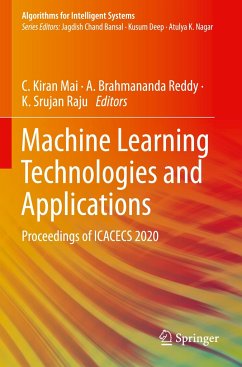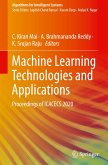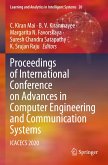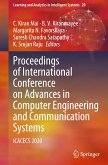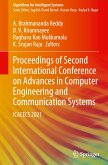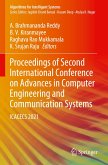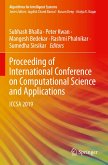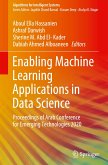Machine Learning Technologies and Applications
Proceedings of ICACECS 2020
Herausgegeben:Mai, C. Kiran; Reddy, A. Brahmananda; Raju, K. Srujan
Machine Learning Technologies and Applications
Proceedings of ICACECS 2020
Herausgegeben:Mai, C. Kiran; Reddy, A. Brahmananda; Raju, K. Srujan
- Broschiertes Buch
- Merkliste
- Auf die Merkliste
- Bewerten Bewerten
- Teilen
- Produkt teilen
- Produkterinnerung
- Produkterinnerung
This book comprises the best deliberations with the theme "Machine Learning Technologies and Applications" in the "International Conference on Advances in Computer Engineering and Communication Systems (ICACECS 2020)," organized by the Department of Computer Science and Engineering, VNR Vignana Jyothi Institute of Engineering and Technology. The book provides insights into the recent trends and developments in the field of computer science with a special focus on the machine learning and big data. The book focuses on advanced topics in artificial intelligence, machine learning, data mining and…mehr
Andere Kunden interessierten sich auch für
![Machine Learning Technologies and Applications Machine Learning Technologies and Applications]() Machine Learning Technologies and Applications121,99 €
Machine Learning Technologies and Applications121,99 €![Proceedings of International Conference on Advances in Computer Engineering and Communication Systems Proceedings of International Conference on Advances in Computer Engineering and Communication Systems]() Proceedings of International Conference on Advances in Computer Engineering and Communication Systems161,99 €
Proceedings of International Conference on Advances in Computer Engineering and Communication Systems161,99 €![Proceedings of International Conference on Advances in Computer Engineering and Communication Systems Proceedings of International Conference on Advances in Computer Engineering and Communication Systems]() Proceedings of International Conference on Advances in Computer Engineering and Communication Systems177,99 €
Proceedings of International Conference on Advances in Computer Engineering and Communication Systems177,99 €![Proceedings of Second International Conference on Advances in Computer Engineering and Communication Systems Proceedings of Second International Conference on Advances in Computer Engineering and Communication Systems]() Proceedings of Second International Conference on Advances in Computer Engineering and Communication Systems185,99 €
Proceedings of Second International Conference on Advances in Computer Engineering and Communication Systems185,99 €![Proceedings of Second International Conference on Advances in Computer Engineering and Communication Systems Proceedings of Second International Conference on Advances in Computer Engineering and Communication Systems]() Proceedings of Second International Conference on Advances in Computer Engineering and Communication Systems185,99 €
Proceedings of Second International Conference on Advances in Computer Engineering and Communication Systems185,99 €![Proceeding of International Conference on Computational Science and Applications Proceeding of International Conference on Computational Science and Applications]() Proceeding of International Conference on Computational Science and Applications161,99 €
Proceeding of International Conference on Computational Science and Applications161,99 €![Enabling Machine Learning Applications in Data Science Enabling Machine Learning Applications in Data Science]() Enabling Machine Learning Applications in Data Science161,99 €
Enabling Machine Learning Applications in Data Science161,99 €-
-
-
This book comprises the best deliberations with the theme "Machine Learning Technologies and Applications" in the "International Conference on Advances in Computer Engineering and Communication Systems (ICACECS 2020)," organized by the Department of Computer Science and Engineering, VNR Vignana Jyothi Institute of Engineering and Technology. The book provides insights into the recent trends and developments in the field of computer science with a special focus on the machine learning and big data. The book focuses on advanced topics in artificial intelligence, machine learning, data mining and big data computing, cloud computing, Internet of things, distributed computing and smart systems.
Produktdetails
- Produktdetails
- Algorithms for Intelligent Systems
- Verlag: Springer / Springer Nature Singapore / Springer, Berlin
- Artikelnr. des Verlages: 978-981-33-4048-0
- 1st edition 2021
- Seitenzahl: 364
- Erscheinungstermin: 17. März 2022
- Englisch
- Abmessung: 235mm x 155mm x 20mm
- Gewicht: 552g
- ISBN-13: 9789813340480
- ISBN-10: 9813340487
- Artikelnr.: 63453627
- Herstellerkennzeichnung Die Herstellerinformationen sind derzeit nicht verfügbar.
- Algorithms for Intelligent Systems
- Verlag: Springer / Springer Nature Singapore / Springer, Berlin
- Artikelnr. des Verlages: 978-981-33-4048-0
- 1st edition 2021
- Seitenzahl: 364
- Erscheinungstermin: 17. März 2022
- Englisch
- Abmessung: 235mm x 155mm x 20mm
- Gewicht: 552g
- ISBN-13: 9789813340480
- ISBN-10: 9813340487
- Artikelnr.: 63453627
- Herstellerkennzeichnung Die Herstellerinformationen sind derzeit nicht verfügbar.
Dr. Kiran Mai Cherukuri, working as Professor in the Department of Computer Science & Engineering, VNR VJIET, has over 31 years of experience in the field of academic research and technological education. She has a multi-disciplinary approach due to varied roles taken up, including but not limited to teaching, research and administration. She was awarded as "Best teacher in Computer Science" in the year 2010, by the professional body-International Society for Technology in Education (ISTE). She also worked at various administrative positions in the institute (Principal, Dean Academics and Head of the Department) and has an extensive experience in internal administrative tasks and communication. As Head of the Department, she took the prime lead, in setting up the UG and PG laboratories and a research lab in virtual reality and real-time computing. While serving in the administrative positions as Vice-Principal and Principal, she was instrumental in designing the policiesand strategies for the institute and also the administrative manuals. Dr. Kiran Mai also administered the processes and could get five departments of the institute recognized as research centers by the JNTUH, the affiliating university. The institute was twice NBA accredited and NAAC accredited with 3.71 CGPA and was also sanctioned UGC autonomous status, while she was in the role of Vice-Principal. As Dean Academics, she played a key role in curriculum revision, enhanced the learning by doing component for practical courses and introduced the concept of WIT & WIL (Why I am Teaching, What am I teaching and Why I am Learning, What am I learning). With her industrial experience, where she headed ISO 9002 division - document control, she could frame and document the processes and procedures in the institute with ease. This made the institute also ISO certified. Being a member of the Internal Quality Assurance Cell (IQAC), she administers the quality procedures in the institute and performs periodical audit of the academic and administrative processes. Under her leadership, the institute was recognized by UGC as College with Potential for Excellence, got the UG and PG courses re-accredited. She published 36 papers in various reputed national and international journals, conducted faculty development program in deep learning and intelligent systems and staff development program in data mining, with the funding from AICTE. She actively participated in the research projects and guided nearly 75 UG projects and 20 PG projects. Currently, four research scholars are working under her guidance. She co-chaired many international conferences. Her research paper on data mining for deforestation using Polyanalyst, presented at the IEEE conference held at Seoul, South Korea, in 2005, was selected as the best paper. She was on the Editorial Board for two Korean journals. Her areas of interest are network communications, data engineering and block chain technologies. Dr. A. Brahmananda Reddy working as Associate Professor in the Department of Computer Science & Engineering at VNR Vignana Jyothi Institute of Engineering and Technology (VNR VJIET), Hyderabad. He done his Ph.D. from Jawaharlal Nehru Technological University Anantapuramu (JNTUA) Anantapuramu, in the area of Text Mining, M.Tech. - Computer Science in 2007 from JNTUCEA, Anantapuramu, and B.Tech. in 2004 in Computer Science and Engineering. He has over 13 years of experience in the field of academic research and technological education and has more than 15 research papers published in various reputed national/international conferences and journals which are listed in Scopus, Web of Science, IEEE, Inderscience and Springer Proceedings. He is a member of IEEE and a lifetime member of ISTE and CSI. Dr. Brahmananda Reddy's research interests include data mining, text mining, natural language processing, semantic web and social networks, machine learning, deeplearning and image processing. He is conducting many seminars/workshops/FDPs for the benefit of students and faculty in and out by the eminent personalities from various reputed institutions and also delivered guest lectures on various topics in various academic institutions. He has guided many UG and PG projects in various mezzanine technologies. He is in charge for students' Industrial Visits and establishing MoUs between Institute and Industries to reducing the gap between academia and industry. He is a jury member for the Smart India Hackathon Grand Finale (SIH 2018, SIH 2019 and SIH 2020) Software Edition organizing by AICTE and MHRD in association with state governments and reputed industries. He performed as Session Chairs for various international conferences and Reviewer for various reputed international conferences and journals. Dr. K Srujan Raju is currently working as Dean Student Welfare and Heading Department of Computer Science & Engineering at CMR Technical Campus. He obtained his Doctorate in Computer Science in the area of Network Security. He has more than 20 years of experience in academics and research. His research interest areas include computer networks, information security, data mining, cognitive radio networks and image processing and other programming languages. Dr. Raju is presently working on 2 projects funded by Government of India under CSRI & NSTMIS, has also filed 7 patents and 1 copyright at Indian Patent Office, edited more than 14 books published by Springer Book Proceedings of AISC series, LAIS series and other which are indexed by Scopus also authored books in C Programming & Data Structure, Exploring to Internet, Hacking Secrets, contributed chapters in various books and published more than 30 papers in reputed peer-reviewed journals and international conferences. Dr. Raju was invited as Session Chair, Keynote Speaker, a Technical Program Committee member, Track Manager and Reviewer for many national and international conferences also appointed as Subject Expert by CEPTAM DRDO - Delhi & CDAC. He has undergone specific training conducted by Wipro Mission 10X & NITTTR, Chennai, which helped his involvement with students that is very conducive for solving their day to day problems. He has guided various student clubs for activities ranging from photography to Hackathon. He mentored more than 100 students for incubating cutting-edge solutions. He has organized many conferences, FDPs, workshops and symposiums. He has established the Centre of Excellence in IoT and Data Analytics. Dr. Raju is a member of various professional bodies and received Significant Contributor Award and Active Young Member Award from Computer Society of India and also served as a Management Committee member, State Student Coordinator & Secretary of CSI - Hyderabad Chapter.
Chapter 1. Prediction of Anemia Disease Using Classification Methods.- Chapter 2. Diabetic symptoms prediction through retinopathy.- Chapter 3. Prediction of Cervical Cancer.- Chapter 4. A new 5-layer model approach for Pneumonia Prediction.- Chapter 5. Prediction of Liver Malady using Advanced Classification Algorithms.- Chapter 6. A Fuzzy based Approach for Indian Standard Classification of Soils.- Chapter 7. Blocking Mobile Based Games and Nullifying the Search String Containing Inappropriate Words.- Chapter 8. A methodology to retrieve information from ontologies with the application of D2R Mapping and SPARQL.- Chapter 9. Fuzzy logic controller for accurate diagnostics in X ray film.- Chapter 10. Heart Attack Classification using SVM with LDA and PCA linear transformation techniques.- Chapter 11. Distributed Training of Deep Neural Network for Segmentation-free Telugu Word Recognition.- Chapter 12. Word Sense Disambiguation for Telugu using Lesk.- Chapter 13. Identifying the Duplicate Questions in Community Question Answering Forums using Machine Learning Approaches.- Chapter 14. A Comparison of Classical Machine Learning Approaches for Early Structural Damage Identification.- Chapter 15. Real Estate Sales Forecasting with SVM Classification.
Chapter 1. Prediction of Anemia Disease Using Classification Methods.- Chapter 2. Diabetic symptoms prediction through retinopathy.- Chapter 3. Prediction of Cervical Cancer.- Chapter 4. A new 5-layer model approach for Pneumonia Prediction.- Chapter 5. Prediction of Liver Malady using Advanced Classification Algorithms.- Chapter 6. A Fuzzy based Approach for Indian Standard Classification of Soils.- Chapter 7. Blocking Mobile Based Games and Nullifying the Search String Containing Inappropriate Words.- Chapter 8. A methodology to retrieve information from ontologies with the application of D2R Mapping and SPARQL.- Chapter 9. Fuzzy logic controller for accurate diagnostics in X ray film.- Chapter 10. Heart Attack Classification using SVM with LDA and PCA linear transformation techniques.- Chapter 11. Distributed Training of Deep Neural Network for Segmentation-free Telugu Word Recognition.- Chapter 12. Word Sense Disambiguation for Telugu using Lesk.- Chapter 13. Identifying the Duplicate Questions in Community Question Answering Forums using Machine Learning Approaches.- Chapter 14. A Comparison of Classical Machine Learning Approaches for Early Structural Damage Identification.- Chapter 15. Real Estate Sales Forecasting with SVM Classification.

